
Phonics As a Basis for Simplified Spelling.
Analysis of English Speech Sounds and Phonemes.
Alternate Orthographic Representations of English Words.
This document provides an analysis of English spelling and the speech sounds that are signaled by the written form of the language. You'll find remarkable research here that resulted from 30 years of intense study, conducted by Dr. Edward Rondthaler during the last 50 years of his life. At the time of this writing (August, 2007), he is still active at age 102.
This writer was privileged to work as his aide during the 30 year span of this project. I provided mainframe computer programs for Dr. Rondthaler's use before the desktop computer had been invented or embraced. The Radio Shack TRS 80 was about to be released when his serious analysis began.
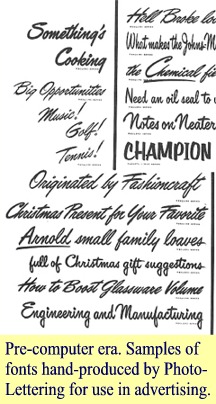
As background, Edward Rondthaler was the President of Photo-Lettering, Inc. in New York City for many years between 1950 and 1980, a company that produced the cover-headlines for many of the top 50 magazines of that era such as Saturday Evening Post, Life Magazine, and others. Photo-Lettering had a collection of 5,000 artistic alphabet fonts on 8 by 10 inch negatives, produced by artists all over the world. The artists got a royalty every time their letters were used in a headline. Advertisers would order special lines for their ads - constructed from the Photo-Lettering fonts. See examples.
Dr Rondthaler eventually helped form a new company called International Typeface Corporation and he became the CEO. The thousands of photographed fonts that they owned were gradually re-developed into many of the computer fonts we use today. ITC provided copyright protection for many of the artists who produce our popular fonts today.
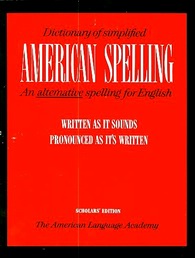 During his years with ITC, Edward Rondthaler's English language research became a driving interest and upon retirement, a full time occupation. Twenty five years later his results were published in a privately-printed book called "American Spelling." He soon regretted the book title because his research applies to the English language as a whole and has no attachment to any one country or dialect. A few copies of the book are still available from the ALC archives if you contact the ALC President.
During his years with ITC, Edward Rondthaler's English language research became a driving interest and upon retirement, a full time occupation. Twenty five years later his results were published in a privately-printed book called "American Spelling." He soon regretted the book title because his research applies to the English language as a whole and has no attachment to any one country or dialect. A few copies of the book are still available from the ALC archives if you contact the ALC President.
Dr Rondthaler wrote newspaper editorials and opinion papers almost every day on a variety of topics, often related to literacy, learning to read, and illiteracy. One book titled "Life With Letters" contains autobiographical materials and a fascinating review of his life. Copyrighted in 1981 it was published by Photo-Lettering, Inc, now out of print. Later the ALC may post selected scanned pages from this book on the Internet if requested.
The goal here is to present a few extracts from his English language research hoping that readers will gain insight into the unique results he obtained. Further down, links will be available for a new generation of researchers who may want to access the corpus of 44,000 words and gain insights from the various files.
You might wonder how an expert in fonts, advertising, typesetting, and art became attracted to the cause of literacy, reading, and spelling. How could that happen? Well, there is a rational bridge as can be shown.
Persons designing ads for major magazines hope they can influence readers not only with clever words, but also through artistic use of letter-shapes - carefully designed fonts and mood-setting background colors. Artists in general and font designers in particular have some serious personal "phobias" (opinions) - things they really really care about, such as - "what factors cause the letter "A" to be most recognizable? What liberties can an artist take with the letter "A" before it becomes damaged as a recognizable letter?" Really - there are people - mostly artistic persons - who care emotionally and deeply about what we superficial people hardly notice - details too trivial to even mention. "Don't talk to me about fonts!"
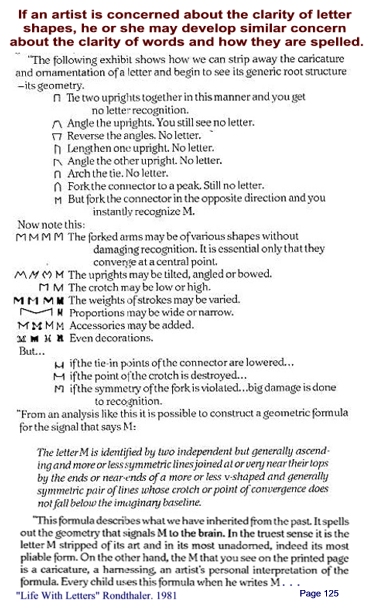
In my periodic encounters with font designers and ad agency staff, I encountered pages of information about the letter "Q" and the parts of it that could be skewed, boxed, slanted, etc., and how much can be missing before it becomes unrecognizable. See example (right side) regarding the letter "M."
Us lay people can hardly believe that anyone cares that much about the letter "M." Highly talented Photo-Lettering artists created alphabets made out of light bulbs, pennies, flowers, oboes, corn stalks, and also special fonts for tomb stones and playing cards. But the artist was always foremost concerned, worried, and hand-wringing with each pen stroke - "is my letter clear and recognizable - as good as it can or should be?" See the example to the right. Especially the last paragraph.
Type-font creators truly live out this seemingly "phobic need" for clarity. "Phobia" in jest, because most of us read with cursory glances, hardly noticing whether font shapes have any influence on our minds. We don't notice whether we stay longer with text that has one shape of the letter "A" or some other adorned letter "A."
But now the bridge to literacy becomes clear. The next concern of these deeply-caring and talented people naturally follows - "are the letters themselves being arranged into groups (words) that clearly signal how people ought to sound out syllables and speak these English words?"
Just as the letter "M" has rules that have to do with clarity, how might letters be better arranged into words to most clearly signal the intended or implied sounds of syllables? Shouldn't they be as clear as possible for all persons who want to read or speak the language? Orthography refers to the written form of a language, and English orthography didn't measure up very well when examined scientifically by Dr. Rondthaler - who was one of those "fussy people" believing that clarity of letter shapes AND THE ARRANGEMENT OF LETTERS, ought to be made as clear and consistent as can be achieved. The symbols in math, and music are used in consistent ways - a requirement. Why not also in the written form of English?
Rondthaler's work was based on analyzing the 44,000 most used English words and then attempting to place letters in phonic arrangements to see how words would look if spelling was simplified in exactly the ways that phonics is simplified for children. A few hundred "phonically-spelled" words benefit children who're learning to read. With phonics, children are allowed (temporarily) to see only certain words that use letters consistently to represent the English speech sounds.
But to extend this concept to the entire English language is very difficult. The spelling standards presented in dictionaries use letters to represent sounds but they're inconsistent about 81% of the time given the "correct" spellings that dictionaries have standardized.
By the way, there are over 7,000 English words that ARE SPELLED CONSISTENTLY. See them on this web site at "Strategies for ESL Teachers."
Quite a few linguists approach the simplification of English spelling by trying to add new letters to the alphabet so that our 42 speech sounds can be represented with more than just the normal 26 letters. Other proposals add dots and lines above some of the existing letters. Dr. Rondthaler's analysis that follows identified vowel and consonant uses and after years of effort found ways to use existing letters in consistent ways through all 44,000 most-used English words. The reasons for arriving at his destination will become visible as you review some of the findings presented below.
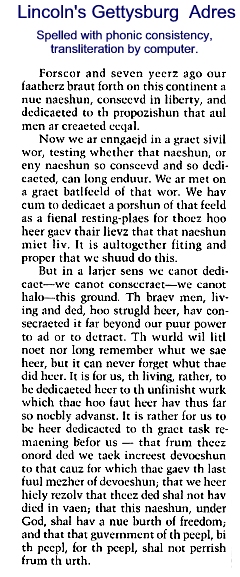
Rondthaler's simplified spelling system has been called by various names, such as Reformed Spelling, Sound-Write, Sound-Spel, Simplified American Spelling, Phonic Spelling, "Get-it-out-of-here," and some times sincerly - "Don't even think of it."
Why the negatives? The suggestion that there's something wrong with dictionary-defined spelling or that spelling could be more accurate and simple sometimes generate emotional reactions that are visible, noisey, and relentless. School teachers, professors, and most parents love English spelling as it is. People watching spelling-bees broadcast on TV get tears in their eyes. They respect the bravery and brightness of any child able to compete and show such "intelligence." The ability to spell difficult words has become a measurement, a type of intelligence-placement in our social hierarchy.
Those who know how to spell are easily distinguished from others who don't know make visible spelling mistakes. Many literate people hope this proud distinguishing factor never changes although the reasons are seldom identified. The reasons raise moral uncertainties and questions. You would almost think it's a God-given right to privately think less of people who struggle with English reading or spelling. They are beneath us. We learned to read and spell words so why didn't they learn to spell and read? Illiterate people are down-trodden in many visible ways.
Despite our own spelling uncertainties, and our forever-reaching for a dictionary to find the "correct" spelling, there's an attitude that "good people learned to read and write without any difficulty, and those who didn't just weren't smart enough, or disciplined enough, or didn't take advantage of their opportunities, or were lazy, or their parents were no-goods and didn't read to their kids, or they've never tried hard enough."
For example, this attitude: "If illiterate persons wanted to learn to read they should just watch children's programs on TV - or do something or other - they're just probably too lazy." This is probably imagined privately by some people. In fact evidence abounds.

Meanwhile over 40 million persons in the US (plus those in all English-speaking countries) wish they could learn to read, get a driver's license, and read street signs. Spelling is not a school subject in most European countries because those languages spell words typically with 80% consistency. English words are spelled with 80% inconsistency - 81% to be exact.
The end result of Dr. Rondthaler's research produced a book of 44,000 words in which each English word had a simplified version of the word just below. The importance of the word (how often we use each word) was also shown. The small sample shown (right side) shows that the word ABILITY would need no simplification because the letters signify directly and accurately the speech sounds that should be spoken or imagined. the word ABILITY is typically used 80 times in 1 million word of text.
The word ABIDING does not clearly signify the intended sounds because the letters "BID" within the word - if taken literally - would prompt us to say "a- bid -ing" and not "a-bide-ing. However the desired vowel sound is properly signified in many other words with the letters "ie" so the simplified version of ABIDING would be ABIEDING. It turns out that the letters "IE" could be used throughout all English words to signify that "IE" sound - every time. The dictionary of 276 tightly printed pages does just that - all English speech sounds are represented accurately and consistently throughout all English words. Rondthaler arrived at the full harmony expressed in the dictionary based on the research tables that follow.
To view full sample pages from the "American Dictionary" in PDF format, Click These Items:
Page 26.
Page 40.
Page 215.
When these pages appear, you must click the Adobe tool-bar enlargement button to enlarge it to 100% size.
Phonetic spelling is a picture of the word's pronunciation - a "phonetic picture," a self-pronouncing profile of the spoken word. This shouldn't have to be stated because, after all, that's what written words are meant to be. They were invented to do just that - to signify spoken syllables and words through a consistent arrangement of letters we agree to use. With phonic or reformed spellings, they accurately signify our spoken sounds.
Here are selected examples of the type of linguistic research that eventually enabled a coherent English dictionary to be organized and presented as a system of alternate spellings - an extension of the phonics concept, now expanded as a logical basis for spelling all words throughout the entire English vocabulary .
The simplest example would be the letter "A." The researcher asks three questions: 1/ What sound do people most often associate with the letter "A"? 2/ Are other letters sometimes used to represent the sound your hear when speaking the word "HAD"? 3/ How often is the letter "A" used unnecessarily and confusingly to represent other English sounds?
Sound out the word "HAD" or "BAD" or "LAD." That aah sound is easily identified as a common necessary vowel and the letter "A" seems to represent it well.
Eventually after years of analysis - that had to include spelling variations representing all the English sounds - only then could the letter "A" be presented confidently and uniformly through all 44,000 words as a reliable symbol that always and only represents the aah sound. In these proposed phonic word lists, the letter "A" always signals the "aah" sound that you hear when saying "CAT" or "MAT."
 However, research revealed that eight other letter-combinations are randomly used to signal readers to imagine the same aah sound. You can see the examples - left side. In other words, if you sift through all 44,000 words, you will find words that use "A I " to signal the same aah sound heard in "PLAID, CLAID" and a few others. These "exceptions" have to be memorized or must be encountered by learners often enough that they finally accept the exception.
However, research revealed that eight other letter-combinations are randomly used to signal readers to imagine the same aah sound. You can see the examples - left side. In other words, if you sift through all 44,000 words, you will find words that use "A I " to signal the same aah sound heard in "PLAID, CLAID" and a few others. These "exceptions" have to be memorized or must be encountered by learners often enough that they finally accept the exception.
Worse, other words attempt to signal the aah sound by using the letters a and e - as in "HAVE." There are a lot of these exceptional cases, terribly confusing for persons learning to read. Observe on the list above-left, that the yellow vertical line indicates that in the finalized phonic spellings, the letter "A" can be used uniformly and consistently.
Look at the other strange combinations of letters that are used to cue us to make an aah sound. In the diagram above you see in parentheses (A I) (AL) (I-UE) (UA) (AU) (AH) and the amazing word HARANGUE where "a - ue" letters are used to signal the aah sound.
If there were merely eight exceptions, it wouldn't matter. But these examples comprise over 250 words that mix this variety of letters into words sprinkled throughout the language. Then you look at how often these words are used (in one million words of text - researched by Brown University) and you'll find over 150 important words in which the letter "A" ought to be used - but isn't, and 50 others where it is used inconsistently, and about 150 others that contain the letter "A" for no reason at all.
In answer to the third question, YES, there are many times when the letter "A" is used to signal some speech sound other than the aah sound we have just assigned to it. These few words represent about 100 words that misuse (abuse) the letter "A," using it to signal other sounds, as in these words: MANY, HEAD, CALM, HURRAH, WARY, AISLE, DIAMOND, AYE, COURAGE, LEARNER, LIAR, AUTO, ADJUST. Almost all vowel sounds and sliding-vowel sounds are seen in these examples - instances where you would think that an "aah" sound was desired - but no - the reader might actually be expected to supply any of the various vowel sounds - willy-nilly.
 One last crushing blow to the person learning to read: There are easily 150 instances where the letter "A" is in a word - but it has no purpose - no sound is desired at all - an empty wasted letter, a filler, a pre-meditated-confuser - as seen in these types of words:
TEAM HEAD ROAD BEAUTY YEARN ROAR.
One last crushing blow to the person learning to read: There are easily 150 instances where the letter "A" is in a word - but it has no purpose - no sound is desired at all - an empty wasted letter, a filler, a pre-meditated-confuser - as seen in these types of words:
TEAM HEAD ROAD BEAUTY YEARN ROAR.
We've examined one vowel sound. There are 16 vowel and sliding-vowel sounds (diphthongs) in English speech - more or less - less if you grew up in Texas - depending on where you live. Similar analysis has been done on all 42 English speech sounds.
The aah sound was one of the simplest and least confusing. Then there are consonants - equally subject to the same illogical choices of letters. The playing field is not level for the person who is trying to "touch bottom," or find a foot hold in this slushy pond of meandering English letters that mean one thing in one word, and many other things in many other words.
For brave persons who want to see results-charts (like the one above) based on other vowels and consonants, you can view or print four pages of PDF files by clicking these items. You must use the Adobe tool bar to increase the page size to 100% for proper viewing.
Analysis Pg 1.
Analysis Pg 2.
Analysis Pg 3.
Analysis Pg 4.
The largest potpourri of letters is used with the "ER" and "UR" sounds. Many people don't or can't distinguish between those two sounds, but to signal that sound there are 36 various letter combinations - none overlapping. In phonic spelling they can all be represented with the letters "UR" or "ER." very nicely. Worst offending words might be MARTYR or ELIXIR.
However, these 35 ill-formed spellings are not very damaging to learners because they soon realize that if the letter "R" is in a word somewhere, then there's a good chance that the "ER" sound is desired - and they are nearly always right..
 Perhaps the biggest "clean-up" that phonic spelling provides is in clarifying when to sound-out the prominent sliding (diphthong) vowels. "AE" as in MADE has 19 ways in "normal" spelling of signaling the AE sound in MADE. All 19 varieties can be represented uniformly and clearly with the letters "AE" which you can see in page 1 referenced above.
Perhaps the biggest "clean-up" that phonic spelling provides is in clarifying when to sound-out the prominent sliding (diphthong) vowels. "AE" as in MADE has 19 ways in "normal" spelling of signaling the AE sound in MADE. All 19 varieties can be represented uniformly and clearly with the letters "AE" which you can see in page 1 referenced above.
Another is the "IE" diphthong as in TRIED or TYPE or RHYME or AISLE or GUIDE. There are 22 ways in which English spelling attempts to signal this sound. This "IE" sound can be represented clearly and uniformly with the letters "IE" which you can reference on the right-side here.
Another is the "OE" diphthong as in GLOWING or YOLK or SEWING. There are 20 ways in which English spelling attempts to signal this sliding-sound. They could all be represented uniformly with the letters "OE" which you can reference on the right-side - shown as they would appear in phonic spelling or writing.
At the bottom of this page there are files that brave people can download if they want to touch, taste, and feel the scope or challenge of dealing with a total corpus of this size (44,000 words) while striving to establish a consistent use of letters throughout the entire list.
The entire 44,000 most-used words are there and the word frequencies are visible. Programs can easily be written to scan through the corpus and find every word that has the letters "OW" together as in GLOWING - but only those followed with "ING" or preceded by a consonant or vowel, etc, counting them to see how many there are and the amount of confusion each anomaly causes. It would be interesting to recover the totaled "counts" of all the examples shown in the four pages referenced above.
HOWEVER, word-tinkering, counting and analyzing is not going to help illiterate persons who want to read a medicine bottle label. Thousands of people imagine they might find a better way to simplify spelling - like starting with "my list" of 50 words that ought to be spelled "my way." Or people who take on a thirty-year analytical study, paying programmers to analyze, count, and sort words or parts of words. There are people who just like to play with cross-word puzzles, words, and word lists, They may be hopeful of discovering "the lost chord, the missing link, the Eureka factor, the Rosetta Stone, or some spelling solution that everyone would agree to and rapidly adopt.
These word lists can be terribly addictive and relationship threatening. Anything beyond hobby-tinkering is unlikely to solve the problem of millions who want to learn to read, now, today - and might if English spelling wasn't so inconsistent and confusing. Maybe it is time for someone to organize a "PHONIC-PURITY MOVEMENT." It might be similar to "pointing swords at windmills," but still, maybe someone can think of a way to do it.
A Phonic Purity movement would be similar to the Environmental Cleanup movements - a fairly good analogy if you think about it. Groundwork is visible here in the clickable research items above, and in this review of Dr. Rondthaler's pioneering efforts. His years of purposeful study gave us significant insights into why English is the third hardest language to learn - requiring six years of spelling drills and classes in the US public schools. He sorted out the framework, and chassis that enabled him to produce this coherent corpus of English words, herein called "Phonic Spelling."
Rather than devote time and energy to produce further word-list analyses, consider the real need, which is to promote and popularize this or some other phonic spelling system that already exists because it could speed the learning experience for illiterate persons, and enlarge opportunities for making millions of lives more productive and prosperous. Most illiterate persons are poor, threatened, frightened, often imprisoned, and useful only in low-paying types of work. They are trapped in oppressive living conditions with few options - until after they learn to read and write.
This writer once helped Dr Rondthaler apply to the Dale Carnegie Foundation for a grant. After all, Dale Carnegie - the philanthropist had funded the construction of hundreds of public libraries - and he independently invented a simplified spelling system of his own, using it in much of his hand-written business correspondence.
The Carnegie foundation denied the grant request, however. The reply letter is on file. It stated that Dale Carnegie, if living, would surely have been interested in promoting and popularizing simplified spelling. However, most of Carnegie's associates assumed he was probably a poor immigrant who accidentally gained wealth, but lacked proper education and never learned to spell.
Some of us watch the annual spelling-bee programs on television, wiping tears from our eyes as we see children bravely spelling the most difficult words, amazed at the discipline and intelligence these well-prepared children display in the face of words impossible to spell. They've been drilled and rehearsed to the max and they stir our emotions.
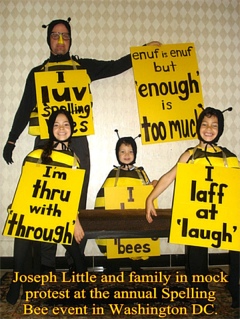 But one ALC member and long-time valued ALC administrator took his family to the Spelling Bee event to stage some publicity for simplified spelling. Not many people would be brave enough to do this. In fact most people don't understand that illiteracy is a national problem.
But one ALC member and long-time valued ALC administrator took his family to the Spelling Bee event to stage some publicity for simplified spelling. Not many people would be brave enough to do this. In fact most people don't understand that illiteracy is a national problem.
There in Washington DC, in mock protest, and with full cooperation of his family, they staged an attention-getting "protest" against "the unnecessary complexities of English spelling."
They're pictured here in costume as they "protested" the annual spelling bee in 2006. It got friendly and humorous attention as TV cameras and the news media carried it for a couple days. This is an instance of thoughtful people asking questions, such as "Is it right to exclude millions of people from improved opportunities and advancement when there are ways to reduce or eliminate the primary literacy inhibitor - the illogical use of letters in English spelling.
We who currently read normal English can at the same time read simplified spelling. But it's not the other way around for the illiterate - those we keep outside the circle of literacy for all the wrong reasons.
Of course we love English just the way it is. It was good enough for Dicken's novels, Elizabeth Browning's poems, Mark Twain's essays, and C.S. Lewis children's books. But John Donne's epic poem "Batter my Heart" and any other classic English literature could have been written in reformed spelling as well as standard or old English. The inventiveness of authors is not at stake here. Rather, life and prosperity are unfairly denied to people who want to learn to read, but who cannot memorize the strange spellings that the rest of us learned in childhood.
We forget that we endured our spelling lessons sometimes with considerable pain in childhood years. Now, having mastered enough of our strange English spellings to get by, now with little thought we too-often look down on a certain class of people - "illiterates" we label them - and with implied sarcasm say "when those foreigners and illiterates wise up and learn to read just like we did, then they'll be welcome in our circles - but not before."
Some readers here will feel the honesty of this accusation and the moral question it raises. We should think about it until we find ways - not necessarily as Joe Little did above, but in our own ways, become open to a more simplified spelling system. A PHONIC PURITY MOVEMENT ought to "tilt at this windmill" until illiteracy begins to diminish. Despite hundreds of volunteer agencies, and government grants, and literacy initiatives, the number of illiterate persons increases about 4 million per year in the United States alone. Like that phrase "It's the economy, stupid," think about its parallel - "It's the spelling system, stupid." It's far and away the biggest barrier to literacy.
For most people (like this author) who are too proper, too elite, to participate in street protests, here then is a list of various ALC word-list files that may be of interest to researchers and "word tinkerers" who can go poking and picking through the pool of English words. These are all clickable items. Some of the XLS files are slow loading because they contain tall skinny columns of up to 44,000 words. Allow ample time for loading. Excel files require the Microsoft Excel spreadsheet or it's equivalent. PDF files require the Adobe PDF reader. Enlarge all files to 100% please.
Baseline 7,000 normal English words that are spelled consistently - in alphabetic order (PDF file)
Baseline 7,000 normal English words that are spelled consistently - in order by frequency (PDF file)
37,000 non-phonic words in alphabetic order (Excel XLS file)
37,000 non-phonic words in order by frequency of use (Excel XLS file)
7,000 phonic-only words in alphabetic order (Excel XLS file)
7,000 phonic-only words in order by frequency of use (Excel XLS file)
All 44,000 words - interspersed - phonic and non-phonic (Excel XLS)
A compressed six column list of 7,000 phonic words in alphabetic order (PDF file)
If you use part or all of these word lists in publications, please reference this Web site which is http://AmericanLiteracy.com .
See also Sound-Write Software which enables the computer to speak these or any words - individually or in sentence form - over and over for student practice in hearing the so-called normal sounds of selected English words and sentences. It also corrects "invented spellings" on the fly - even for beginning ESL students, filling student writings with normal "correctly spelled" words..
See also Double-Line Software which enables the translation of any text into double lines of normal English and Rondthaler's Phonic Spelling. This software uses Microsoft (tm) Word plus the double-line software on your local computer to achieve the reformed spelling transliterations. The resulting transliterations can be viewed on your computer screen or printed as work sheets for student learners.
ALC staff writer, August, 2007
After proof reading, the spell checker found 28 misspelled words which it corrected. "Diphthong" still confuses me.